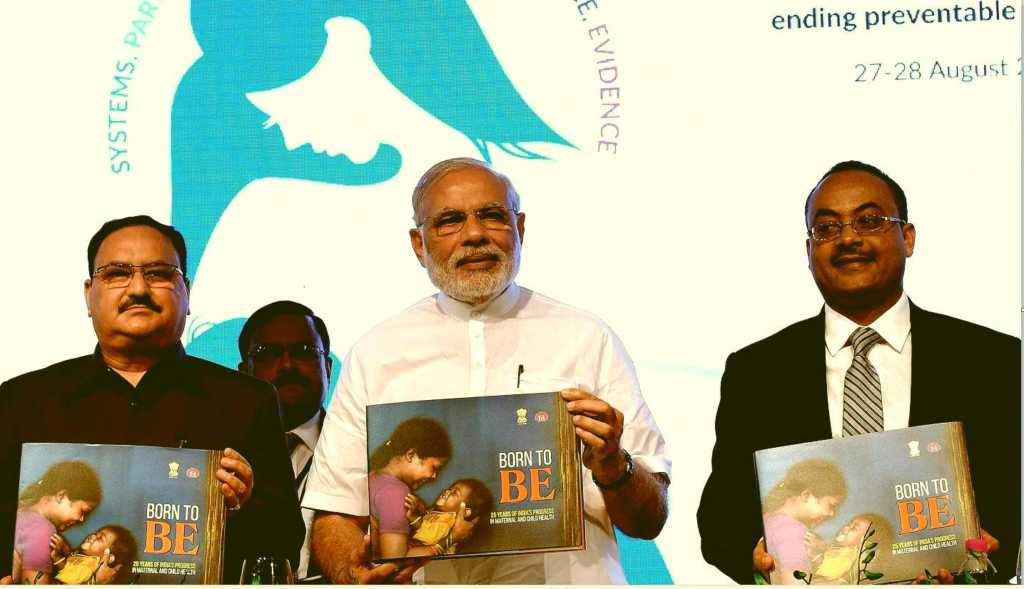PM Modi has had tremendous impact in our country and the way people view politics and governance. Like always, every leader has his followers and critics, PM Modi has too. What is striking about our prime minister, however, is his determined approach towards helping India rise.
Healthcare has been a highly neglected sector in India. India remains a hotbed of many diseases and the primary healthcare continues to remain in shambles. It won’t be unfair to blame the previous governments for the sorry mess that India’s healthcare sector has become. But not all is lost, this government seems committed to give a boost to India’s healthcare sector.
A few of PM Modi’s health care and health insurance related initiatives have garnered huge attention from people across the country and borders too.
Let’s dig into some such initiatives and how they are helping India fix the problem.
New Health Policy 2017
Recently Modi government launched new NHP 15 years after the last health policy was approved. The plan aims to strengthen India’s healthcare system. The policy recommends increasing the public health expenditure by 2.5 percent of the GDP from the current 2 percent GDP on healthcare.
The policy aims to reduce, the currently very high maternal mortality, infant mortality and child death rate due to many non-communicable and infectious diseases. It also targets to eliminate leprosy by 2018, kala-azar and lymphatic filariasis. The policy also intends to reduce the prevalence of blindness to 0.25 per 1,000 persons by 2025. Reduction in premature mortality from cardiovascular diseases, cancer, diabetes or chronic respiratory diseases by 25% by 2025, reduction in the current use of tobacco by 30% by 2025, safe water and sanitation for all by 2020 are some of the other objectives of the New Health Policy 2017.
Swachh Bharat Mission
This celebrated (and equally critiqued) mission has taken grand turns. Modi government reiterated the dream of Mahatma Gandhi to make India clean and launched Swachh Bharat Mission (Clean India Initiative) in 2015.
The government imposed Swachh Bharat Cess on 15 November 2015 as acceleration towards clean India. It is applicable only on taxable services at the rate of 0.5%. The cess is collected in the Consolidated Fund of India to finance and promote Swachh Bharat initiatives of the government. The government raised INR 3,901.76 crore during fiscal 2015-16.
Entering Digital India with E-health
The Digital India campaign by Modi government in 2015 showed the effort to digitalize healthcare with E-Health for effective and efficient health care services.
The major advantages are increase in the knowledge database, simplifying complex concepts and transparency.
Healthcare services like ePharmacy, eDiagnostics can eliminate malpractices in the healthcare industry and make it accessible to even the remote areas having little access to healthcare. The introduction of electronic health record (EHR), national knowledge network for tele-education, teleconsultations and digital library are some vital digital intervention for nation’s health.
Open Defecation Free Country
Open air defecation and lack of proper sanitation and hygiene are the root cause of some serious health diseases like diarrhea, intestinal infections, cholera, typhoid, hepatitis. Many water-borne diseases spread due to the transmission of fecal pathogens via water. This leads to malnutrition and poor growth in children.
“Jahan Soch Wahan Shauchalaya” the slogan of Vidya Balan, the brand ambassador of open defecation free India drive, was taken positively by many states of India who acted upon the same immediately.
Recently Sikkim, Himachal Pradesh, and Kerela became the first three open defecations free state of India. Modi government has provided financial assistance to build toilets in households and has made more than 80 lakhs public toilet till date; with an aim to succeed in the mission by 2019.
Insurance Schemes
Health insurance covers for expenses incurred during hospitalization due to illness or surgery. And, it costs Rs 700-800 a year for a cover of Rs 50,000 for individuals aged between 18 and 40 years.
Hospitalization can wipe out the entire savings of those who’re already at a financial disadvantage. Though not offered by Modi government, affordable policies are available from state-owned non-life insurers like New India Assurance and Oriental Insurance. However, if someone is looking for elaborate health insurance features, these policies might not do the job and there are other private insurers in the market who offer affordable yet elaborate health insurance policies.
Door-to-Door Screening for Chronic Diseases
In 2017, on World Cancer Day (4 February) a massive free door-to-door screening for the early detection and treatment of cancer, heart disorders, and diabetes was inaugurated. This program focuses the age group of 30 to 69.
The health of working age population is extremely important for a developing country like India. The chance of survival and productivity is essential to eliminate poverty and growth and development of the country.
Medical Equipment Manufacturing
“Medical devices is one field in manufacturing where India lags. India imports more than 60% of medical devices,” – ET Now
The global market size for medical devices is approximately $220 billion. In recent years, Modi government has introduced some new policies that will help India to tap the growth in medical devices industry. Concerns regarding the domestic production of high-end medical devices and pharmacy equipment manufacturing in India are also being addressed. This will not only increase the accessibility but also affordability of sophisticated equipment in India.
Last year, the Union Cabinet chaired by the Prime Minister Narendra Modi gave its approval for signing a Memorandum of Understanding (MoU) between India and Papua New Guinea on cooperation in the field of Healthcare and Medical Science.
These reforms and other major reforms in the future will propel the healthcare and pharmaceutical sector in India and provide Indians with decent healthcare irrespective of their socio-economic background. Basically, they will make India a healthier nation.
